Mr Dominic Mcafee
Future Making Fellow
Environment Institute
College of Science
Eligible to supervise Masters and PhD - email supervisor to discuss availability.
My research group focuses on developing solutions to enable coastal marine ecosystem restorations to be both a social and ecological success. We examine the ecological and socio-ecological interactions that influence ecosystem health and human well-being, so that we can provide an evidence base to inform the sustainable management of coastlines. I work regularly with local and State Government, environmental non-profits, the aquaculture industry, and local communities on restoration projects ranging from large-scale reef constructions to small-scale community-led restorations. I have a particular passion for restoring oyster reefs, and also work on seagrass, kelp and mangrove forests, and coastal vegetation. I am open to collaboration and happy to discuss Honours and Postgraduate research projects on intertidal and subtidal ecology, socio-ecology, and human well-being associated with marine spaces. I have student projects ready to go on:- Community-based ecosystem restoration- Understanding the drivers of rapid ecosystem recovery- Intertidal oyster ecology- Social perceptions of marine ecosystems and their management
Research on rare and largely forgotten shellfish reef marine ecosystems to understand how we can bring them back using natural solutions and eco-cultural restoration. Read the Great Southern Reef Foundation story here. Post-graduate opportunities are available to understand this rare ecological recovery.
Award winning research on the use of marine sound to accelerate ecosystem restoration. Winner of the 2023 South Australian Science and Innovation Excellence Awards for Excellence in Science and Industry Collaboration.
My research aims to both improve the way we restore marine ecosystems, such as Southern Australia's lost shellfish reefs, and how we communicate their value to the broader public using effective communication that engages people with conservation, so we can build the productivity and adaptability of Australia's marine ecosystems through large-scale restoration of oyster reefs of high social value.
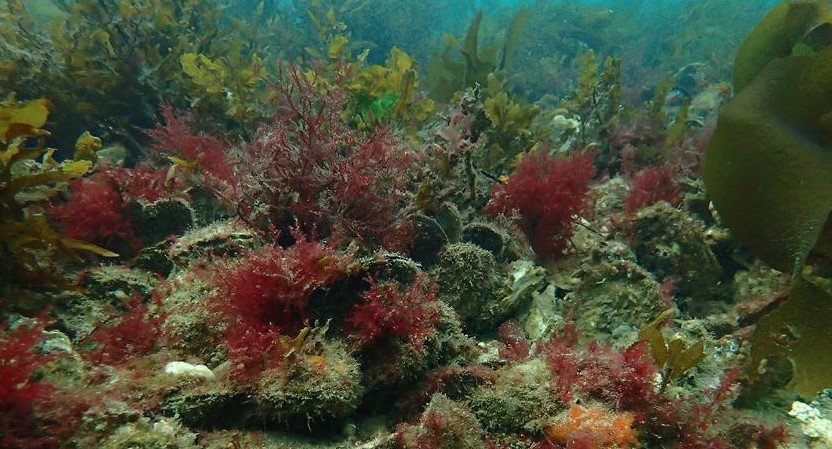
Australia's sole remaining Flat oyster reef in Tasmania. We are working to bring them back. Photo: SD Connell.
Ecosystem restoration of Australia's lost shellfish reefs
My research has been at the central of Australia's shellfish reef restoration movement to restore lost oyster reefs; a national collaboration among research institiutes, State and Federal Governments, and environmental NGOs such as The Nature Conservancy. I regularly work with South Australia's Department for Environment and Water on ensuring these restorations are socially visible and valued, and ecologically monitored and disseminated. My research has focused on improving the way we approach reef restorations, including strategies to enhance natural recruitment and survival of native oysters, those they can support marine biodiversity.
I am interested in all aspects of reef restoration, with a primary focus on enhancing the recruitment and survival of oysters to the reef, ensuring it's long-term growth and performance. Projects include developing multi-species restoration approaches that boost oyster performance; understanding the spatio-temporal dynamics of natural recruitment to maximise reef recovery; targeting for restoration the habitat traits that support ecological function, and developing and testing marine technologies (e.g. underwater speakers) that can accelerate restoration processes.
This nationally collaborative research won the 2020 Eureka Prize Award for Applied Environmental Research, which I shared with four colleagues at research institutes across Australia and The Nature Conservancy. Read more here.
Multi‐species restoration accelerates recovery of extinguished oyster reefs. McAfee et al. 2020, Journal of Applied Ecology.
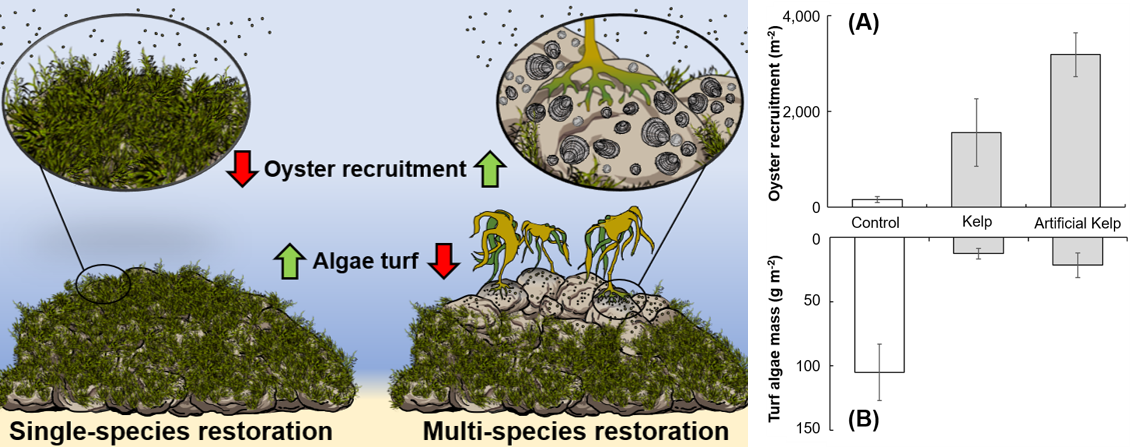
Science on how the sounds of the sea can enhance restoration outcomes
The sounds of the sea can tell us some much about the health of our oceans, and can tell marine animals where to find a great place to live. Our research harnesses the natural sounds of the sea and broadcasts it using underwater speakers within areas where natural marine sounds have been lost. Why do this? Because many marine animals, including invertebrates such as oysters, use sound as a navigational cue to find a home. When we use marine speakers on new reef restorations, we can attract many thousands of additional baby oysters to the reefs to accelerate reef recovery. We've made some exciting discoveries, but have so much more to learn.
Leveraging the cognitive biases of people to improve effective conservation messaging
My research with communication scientists looks to bridge the gap between ecology and conservation psychology to develop a communication strategy that ignites public interest. Public engagement provides a foundation for large-scale restoration initiatives as public support helps legitimize Government investment in restoration. Yet, evidence on the most effective way to communicate conservation issues is limited. Communicating a balance between environmental challenges and optimism for positive environmental change has the potential to improve conservation messaging, and my research examines how the psychological mechanisms of optimism resonates with the intended audience. This research seeks to understand the psychological levers and social practices that inform human perspectives and behaviour towards the environment, so we can use this knowledge to enhance public engagement with conservation.
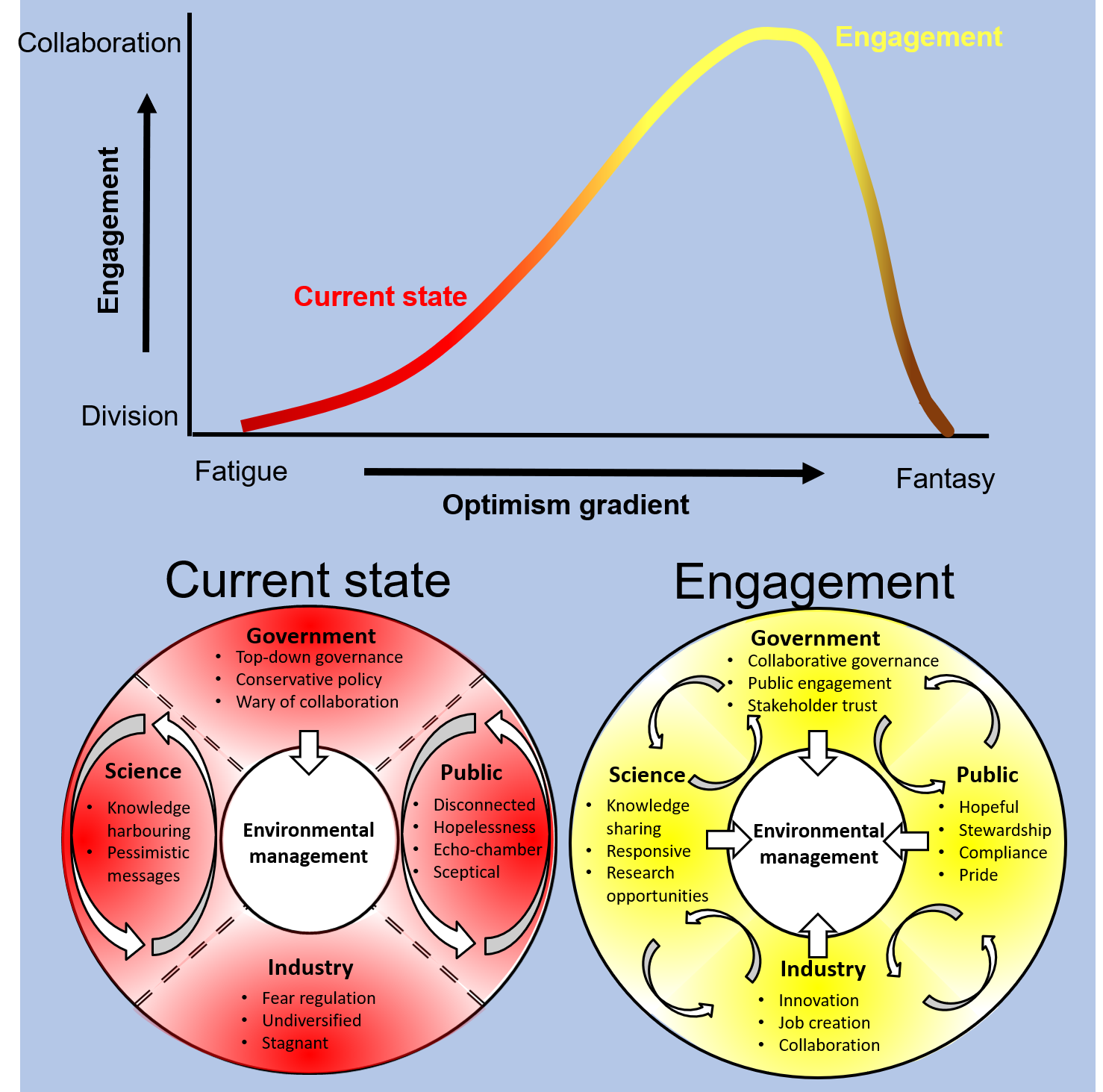
Everyone loves a success story: optimism inspires conservation engagement. McAfee et al. 2019, BioScience.
Other research interests: Ecosystem based management; tests of ecosystem engineering theory; climate-adaptation strategies for coastal systems; invertebrate physiology; mangrove ecology
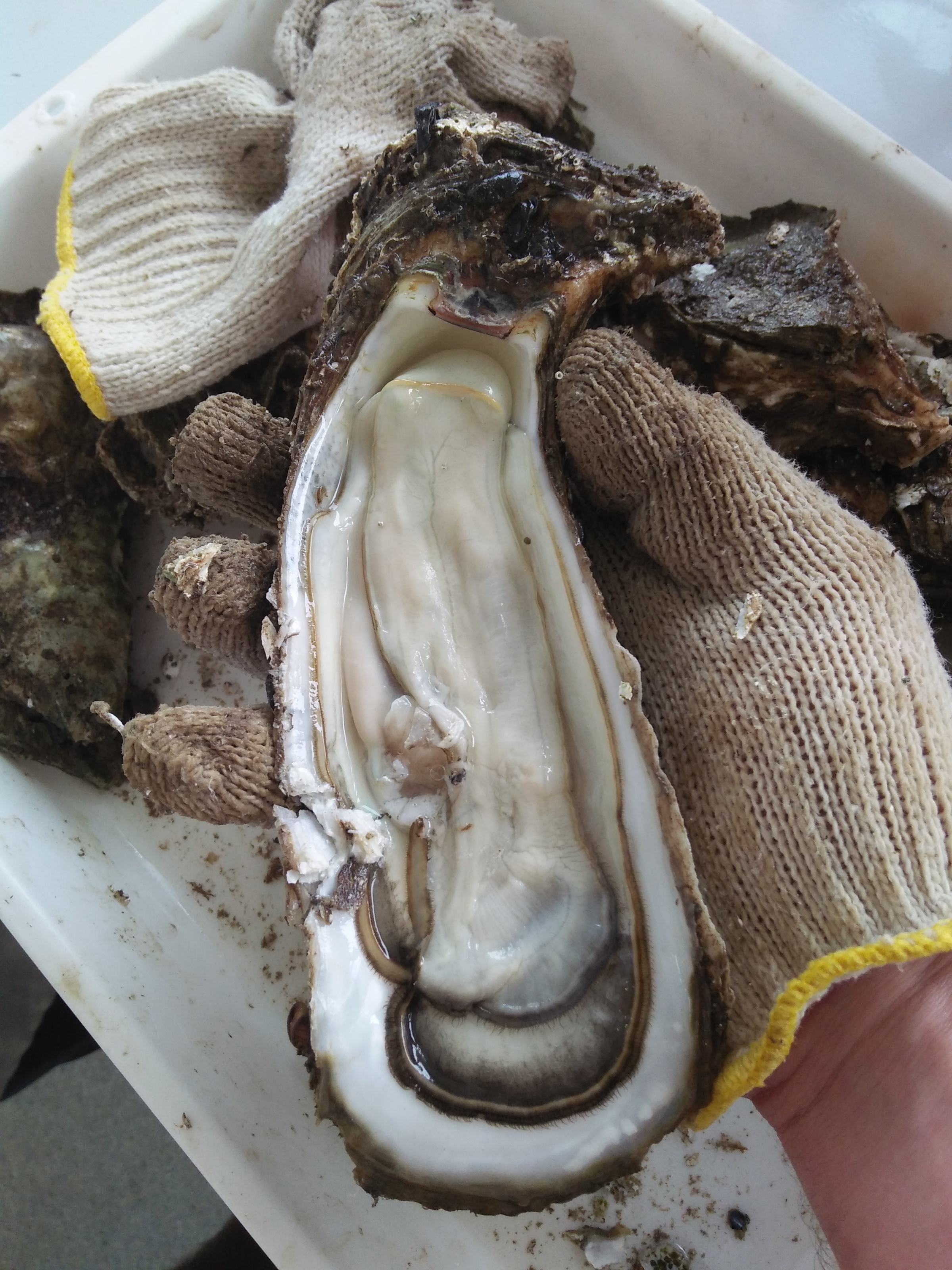
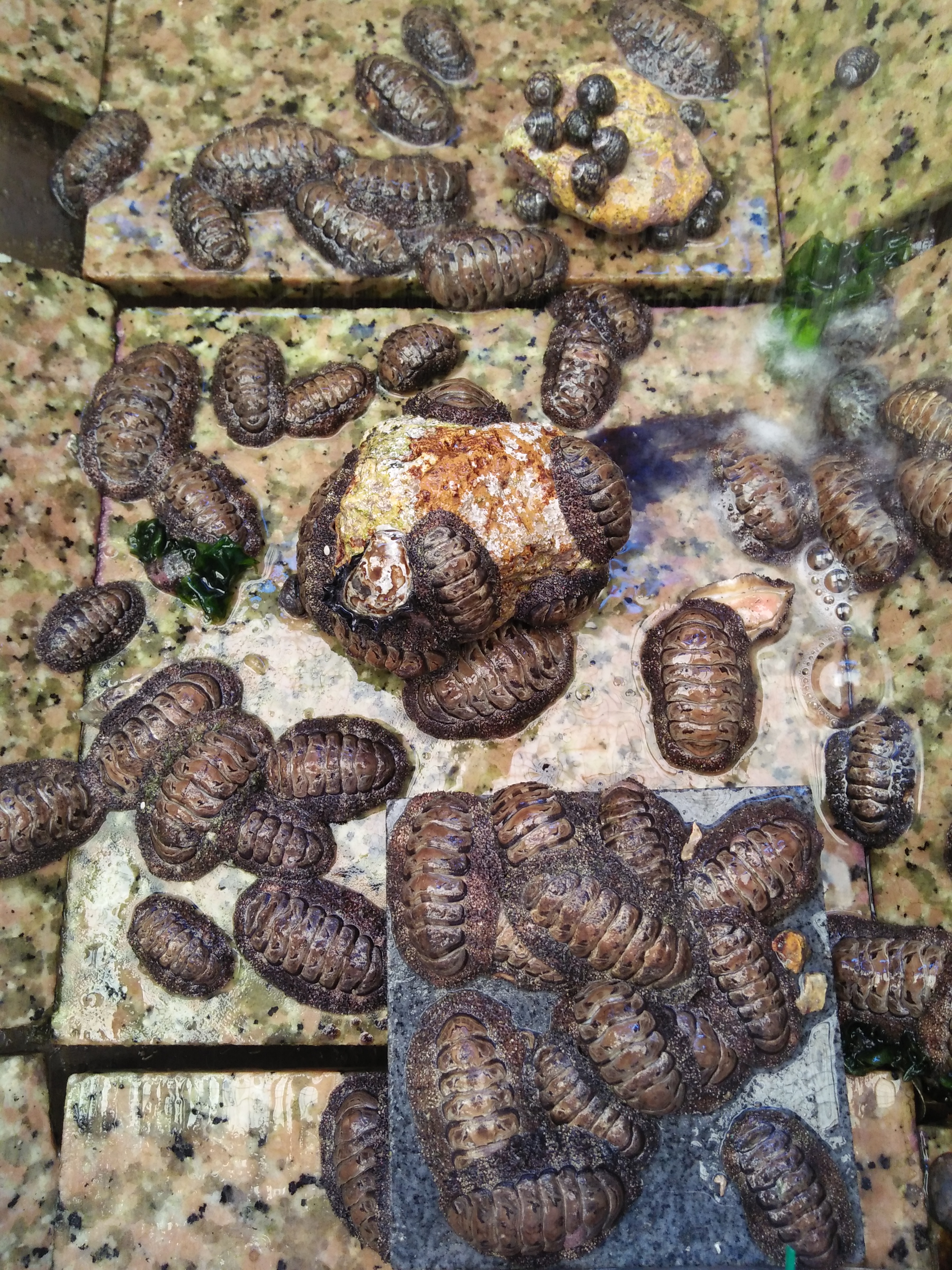
Selected Research Awards
- Australia Geographic Awards for Nature, for Reviving Coffin Bay's Lost Oyster Reefs, 2025
- South Australian Science and Innovation Excellence Awards, Excellence in Science and Industry Collaboration, 2024
- British Ecological Society award, Southwood Prize for best paper by an EMCR in Journal of Applied Ecology, 2023
- SA Climate Leaders Awards, Honorable Mention, SA Premier’s Climate Change Council, 2022
- School of Biological Science Publication Awards, Adelaide University, 2022
- South Australian Tall Poppy of the Year, finalist, 2021
- Young Tall Poppy Award for South Australia, 2021
- University Award for Outstanding Achievement for Excellence in Research by an Early Career Researcher, 2021
- Eureka Prize Award for Applied Environmental Research, 2020
- Order of Merit for Early Career Research Excellence, Faculty of Sciences UoA, 2020
Tall Poppy of the Year finalist, South Australian Science Excellence and Innovation Awards, 2021
| Date | Position | Institution name |
|---|---|---|
| 2024 - ongoing | Future Making Fellow | Environment Institute, University of Adelaide |
| 2017 - ongoing | Postdoctoral Research Associate | The University of Adelaide |
| 2016 - 2017 | Research assistant | Sydney Institute of Marine Science |
| 2016 - 2016 | Endeavour Research Fellow | The University of Hong Kong |
| 2015 - ongoing | Communication committee | Shellfish Reef Restoration Network |
| 2013 - 2017 | Biological Science tutor (part-time) | Macquarie University, Sydney |
| Date | Type | Title | Institution Name | Country | Amount |
|---|---|---|---|---|---|
| 2025 | Award | Australian Geographic Award for Nature | Australian Geographic | Australia | $20,000 |
| 2024 | Award | Southwood Prize | British Ecological Society | United Kingdom | - |
| 2024 | Award | South Australian Environment Awards, Conservation Science Prize | Conservation Council SA | Australia | - |
| 2023 | Award | Excellence in Science and Industry Collaboration | o South Australian Science and Innovation Excellence Awards | Australia | - |
| Date | Institution name | Country | Title |
|---|---|---|---|
| 2013 - 2017 | Macquarie University, Sydney | Australia | PhD |
| 2007 - 2012 | Macquarie University, Sydney | Australia | BSc (Hon1) |
| Year | Citation |
|---|---|
| 2018 | Freeling, B. S., Mcafee, D., & Connell, S. (2018). Compensation then collapse: How Ostrea angasi responds to a warming and acidifying ocean. Poster session presented at the meeting of Australian Shellfish Reef Restoration Network & 19th International Conference on Shellfish Restoration. Adelaide. |
| Year | Citation |
|---|---|
| - | Jones, A., Alleway, H., Santos, P. R. D., & Mcafee, D. (n.d.). Jones_et_al_2021_ClimateSmart_mariculture_revised_supp_tables.xlsx. DOI |
Selected Research Funding and Fellowships
- Community-based shellfish reef restoration, South Australian Government, 2025
- Australian Geographic Awards for Nature, 2025, $20,000
- Future Making Fellowship in the Environment Institute and School of Biological Sciences, 2024 - current
- Subak Research Fellowship, 2022
- ARC Linkage - Addressing social and ecological constraints to expand marine restoration, co-chief investigator, 2021, $445,822
- Department for Environment & Water research grant - Research on Shellfish Reef Restoration in South Australia, 2020, $80,000
- Endeavour Australia Cheung Kong Research Fellowship Award, Australian Government, 2016, $24,500
Course coordination
Course coordinator for Principles & Practice of Research III (SCIENCE 3100) in the BSc Advanced degree, University of Adelaide, 2021.
Guest lecturing
- Frontiers in Marine Science, University of Adelaide, 2018 - 2021
- Estuarine health; Oyster aquaculture, University of Hong Kong, 2016
- Marine Ecology, Macquarie University, 2015 - 2016
Course tutoring
- Marine environmental issues, Macquarie University, 2015-2017
- Marine Ecology, Macquarie University, 2014-2015
- Invertebrate zoology, Macquarie University, 2014
- Experimental design and data analysis, Macquarie University, 2014
- Ecology, Macquarie University, 2013-2014
| Date | Role | Research Topic | Program | Degree Type | Student Load | Student Name |
|---|---|---|---|---|---|---|
| 2025 | Principal Supervisor | Community-based restoration to repair coastal habitats and sustain local stewardship. | Doctor of Philosophy | Doctorate | Full Time | Miss Nichole Lindsey |
| 2025 | Principal Supervisor | People, Culture, Collaboration and Governance to Restore Coastal Ecosystems | Doctor of Philosophy | Doctorate | Full Time | Ms Michelle Margaret Holian |
| 2025 | Principal Supervisor | People, Culture, Collaboration and Governance to Restore Coastal Ecosystems | Doctor of Philosophy | Doctorate | Full Time | Ms Michelle Margaret Holian |
| 2025 | Principal Supervisor | Community-based restoration to repair coastal habitats and sustain local stewardship. | Doctor of Philosophy | Doctorate | Full Time | Miss Nichole Lindsey |
| 2024 | Co-Supervisor | Are Pinna bicolor the key to successful intertidal restoration? | Master of Philosophy | Master | Full Time | Miss Samantha Maree George-Neich |
| 2024 | Co-Supervisor | How to boost coastal restoration through improved reef design and increased community participation via public engagement | Master of Philosophy | Master | Full Time | Ms Lauren Brigitte Woolhiser |
| 2024 | Co-Supervisor | Are Pinna bicolor the key to successful intertidal restoration? | Master of Philosophy | Master | Full Time | Miss Samantha Maree George-Neich |
| 2024 | Co-Supervisor | How to boost coastal restoration through improved reef design and increased community participation via public engagement | Master of Philosophy | Master | Full Time | Ms Lauren Brigitte Woolhiser |
| 2023 | Co-Supervisor | Enacting effective marine ecosystem restoration along the South Australian coast. | Doctor of Philosophy | Doctorate | Full Time | Ms Ishtar Raven Kenny |
| 2023 | Co-Supervisor | Enacting effective marine ecosystem restoration along the South Australian coast. | Doctor of Philosophy | Doctorate | Full Time | Ms Ishtar Raven Kenny |
| 2022 | Co-Supervisor | Science Communication: Sharing via Storytelling (Working Title) | Doctor of Philosophy | Doctorate | Full Time | Ms Mollie Hawkes Hohmann |
| 2022 | Co-Supervisor | Science Communication: Sharing via Storytelling (Working Title) | Doctor of Philosophy | Doctorate | Full Time | Ms Mollie Hawkes Hohmann |
| Date | Role | Research Topic | Program | Degree Type | Student Load | Student Name |
|---|---|---|---|---|---|---|
| 2021 - 2025 | Co-Supervisor | Restoring coastal ecosystems: insights into techniques and scalability of kelp and oyster reef restoration | Doctor of Philosophy | Doctorate | Full Time | Mr Lachlan McLeod |
| 2021 - 2025 | Co-Supervisor | Exploring the social, economic, and ecological dimensions of managing marine ecosystems | Doctor of Philosophy | Doctorate | Full Time | Miss Erin Laura Pichler |
| 2020 - 2023 | Co-Supervisor | Enriching Marine Soundscapes to Restore Australia's Lost Native Oyster Reefs | Doctor of Philosophy | Doctorate | Full Time | Miss Brittany Ruth Williams |









